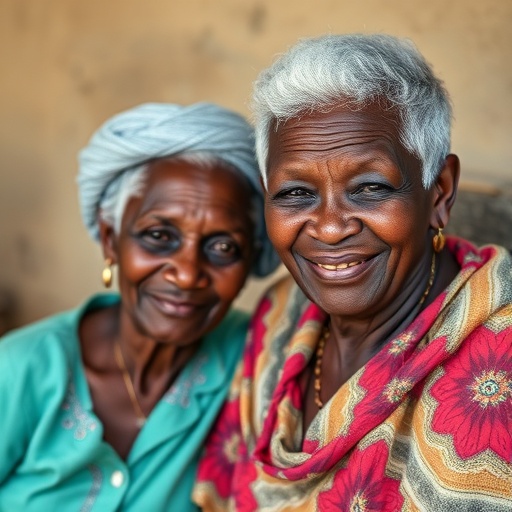The aging population in Cameroon is currently witnessing significant changes in health dynamics, particularly regarding intrinsic capacity—a concept vital to understanding the well-being of older adults. Intrinsic capacity refers to the physical and mental capabilities that individuals possess, making it a crucial aspect of old age. A recent study conducted by Ntsama Essomba, MJ., Andela Ebidiye, J.K., and Noubiap, J.J. sheds light on the prevalence of intrinsic capacity impairment and the associated factors among retired older individuals in Cameroon.
In the study, researchers collected data from a diverse cohort of retired older people across various regions of Cameroon. The goal was to identify the extent of intrinsic capacity impairment, which is characterized by reduced abilities in various domains, including mobility, cognition, and sensory functions. With a growing geriatric demographic, understanding the implications of intrinsic capacity becomes increasingly necessary for healthcare systems, policymakers, and caregivers.
The findings revealed alarming trends. It was observed that a significant portion of the older population in Cameroon suffers from varying degrees of intrinsic capacity impairment. This has raised concerns about the quality of life among retired individuals. The study highlights that factors such as chronic illnesses, inadequate access to healthcare services, and socioeconomic challenges play critical roles in exacerbating these impairments, often leading to premature dependence on caregivers and healthcare systems.
In addition to the prevalence rate, the researchers also examined the socio-economic variables contributing to intrinsic capacity impairments. Data indicated that older adults from lower socioeconomic backgrounds were more prone to experience severe impairments compared to those with higher socioeconomic status. This finding underscores the importance of economic stability and access to resources as fundamental elements to foster healthy aging.
Moreover, the study aimed to emphasize the role of lifestyle factors. Physical activity, nutritional intake, and social engagement were investigated as lifestyle determinants of intrinsic capacity. Interestingly, older individuals who maintained active lifestyles, such as engaging in regular physical exercise and maintaining social connections, exhibited better intrinsic capacity, suggesting that lifestyle interventions could play a pivotal role in mitigating health deterioration.
Furthermore, there is a critical link between intrinsic capacity and mental health. The study indicates that cognitive functions and emotional well-being are significantly affected by intrinsic capacity impairment. Older adults who faced cognitive decline reported higher levels of depression and anxiety. This correlation points to the necessity of holistic approaches in geriatric care that address both mental and physical health, advocating for integrated care models that can lead to improved health outcomes.
As the prevalence of intrinsic capacity impairment escalates, there is an urgent call for the implementation of public health initiatives aimed at older adults. For instance, awareness campaigns to educate communities about healthy aging practices could help mitigate these trends. It is essential for governments to develop programs focused on preventive healthcare measures that promote sustained physical and cognitive health.
Additionally, this research shines a light on the importance of early detection and intervention strategies. Regular health screenings focusing on intrinsic capacity indicators could aid in identifying at-risk individuals before their impairments significantly affect their lives. By fostering early intervention models, healthcare providers can implement targeted strategies that may enhance the intrinsic capacity of individuals at an older age, ultimately supporting their independence and quality of life.
As a continuation of this research, further exploration is warranted to establish causative links and develop evidence-based interventions. By examining the interplay of various factors, researchers can design culturally appropriate health strategies tailored to the unique contexts of older adults in Cameroon. The implications of such studies could transcend to a broader continental scope, influencing geriatric care practices in similar socioeconomic contexts across Africa.
In conclusion, the study authored by Ntsama Essomba, MJ., Andela Ebidiye, J.K., and Noubiap, J.J. serves as a critical reminder of the challenges faced by the aging population in Cameroon. With a growing number of retirees, it is vital to address intrinsic capacity impairment through collaborative efforts involving healthcare professionals, community organizations, and government policymakers. Only then can there be hope for a future where older adults lead fulfilling lives free of the constraints imposed by inadequate intrinsic capacities.
A collaborative approach is essential, involving multi-disciplinary teams that can assess and address the myriad factors affecting the intrinsic capacity of older adults. The research underscores the need for ongoing studies to remain attuned to the evolving challenges faced by this demographic, ensuring that interventions remain responsive and effective. Building a supportive environment, fortified by education and resources, could very well pave the way for a healthy, vibrant aging population.
In light of these findings, it becomes evident that intrinsic capacity impairment represents not just a health concern but a pressing social issue that must be tackled through concerted efforts incorporating public health strategies, community support systems, and individual empowerment. With collective action, the health and happiness of the aging population in Cameroon can be significantly improved, ensuring that they enjoy their retirement years with dignity and vitality.
Subject of Research: Intrinsic capacity impairment among retired older people in Cameroon.
Article Title: Prevalence of intrinsic capacity impairment and associated factors among retired older people in Cameroon.
Article References:
Ntsama Essomba, MJ., Andela Ebidiye, J.K., Noubiap, J.J. et al. Prevalence of intrinsic capacity impairment and associated factors among retired older people in Cameroon.
BMC Geriatr 25, 760 (2025). https://doi.org/10.1186/s12877-025-06421-7
Image Credits: AI Generated
DOI: 10.1186/s12877-025-06421-7
Keywords: intrinsic capacity, aging population, Cameroon, health dynamics, socioeconomic factors, lifestyle interventions, mental health, public health initiatives, preventive healthcare, early intervention.
Tags: aging population health dynamicschronic illnesses in the elderlygeriatric health trends in Cameroonhealth challenges for older adultshealthcare access for retireesimpaired intrinsic capacity in seniorsimplications for healthcare policy in aging populationsintrinsic capacity in old agemobility and cognition in elderlyquality of life in older populationsretired seniors in Cameroonsocioeconomic factors affecting seniors





